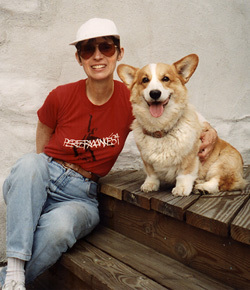
A book club asked us to talk about our new memoir—it tells how a charismatic corgi came to us, just as Joyce was diagnosed with acute myelogenous leukemia, chances of survival 4%.
That was three decades ago, and Joyce attributes her cure, in part, to Nosmo the corgi's devotion. I, however, wanted no more dogs in our life. I wanted to endure no more dog deaths. And I didn't want to be tied down by a dog, when our magazine work required constant travel.
At the book club meeting, a woman asked me: "So when did you start to love Nosmo, and accept him?"
Not easily answered.
For one thing, I instantly loved Nosmo, when he first popped up on our deck. A dog so handsome, so joyous, so charming, so clearly aware, you had to love him. Accept him, though? No, not until one horrific night.
I'd spent that day in Joyce's hospital room, as she lay in bed, bald and skeletal, unable to lift her head. I thought she might be dying. So I stayed by her, fetching ice cream. She could eat nothing else. I made frequent trips back home for Nosmo's walks, and his supper, then back to the hospital. All afternoon and all evening I sat by Joyce's bed, talking, unsure she could hear.
I felt desolate.
I got home at midnight, too weary to think. I took Nosmo out for his final walk in the moonlit meadow. Then I pulled off my shoes and socks and fell into bed, still wearing my jeans and t-shirt, and I instantly sank into unconsciousness.
At 2 A.M., out of deep sleep, I jerked upright in bed, feeling summoned. Had Joyce died? Then I saw Nosmo sitting beside the bed, staring steadily at me. Seeing me sitting upright, he seemed to nod, as if saying, "Finally!" Then he hurried to the stairs, and looked back to urge me on.
"All right!" I said, angry.
I put my feet down beside the bed and it felt wet. I turned on the light—diarrhea covered the rug, and now covered my feet. I managed to get to the bathroom, walking on my heels to keep from spreading the mess everywhere. I washed my feet in the bathtub. Then, cursing under my breath, I followed Nosmo down the stairs and let him out the back door into the yard.
While the corgi walked in the moonlight, I hunched on our deck's steps, burying my head in my hands.
At some point, I realized Nosmo sat beside me, leaning against my leg. I knew he sensed my misery, and offered his warmth and caring.
We sat that way a while. Then I noticed I had my arm over Nosmo's back. I suddenly realized it horrified me, to think of coming home from a day like this with no corgi there to love me.
I heard my own voice: "It's not your fault, Nosmo."
At that moment, I accepted Nosmo into our life.
Afterwards, with a bucket of sudsy hot water, I cleaned the bedroom rug. Then I fell back onto the bed.
I heard Nosmo sigh, as he lay beside me on the floor.
So we became a team of three, a corgi, a woman, and a man.
That's how Nosmo wanted it.
--Richard








